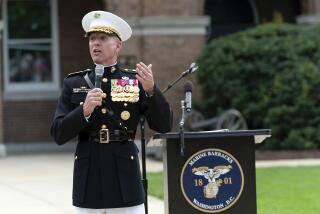Top Marine Defends Corps’ Ability to Guard Embassies
- Share via
WASHINGTON — Gen. Alfred M. Gray Jr., a blunt combat veteran who prefers fatigues to dress uniforms, vowed Wednesday to take a no-nonsense approach to the Marine Corps and his most famous officer, Oliver L. North.
Gray, in his first meeting with Pentagon reporters since becoming the Marine commandant on July 1, defended the Marines’ ability to protect U.S. embassies, despite recent espionage scandals.
The four-star general said also that, during his term, Marine officers will be assigned to jobs based on a determination of where they are needed--without regard to personal preferences.
“We have a new policy now,” Gray said. “They’re going to go where I want them to go and do what I want them to do for the length of tour that I prescribe, based on the needs of the country and the needs of the corps.”
He attacked “careerism,” which he defined as “people who care more about themselves than they do the people they’re privileged to lead.”
That new policy includes North, a Marine lieutenant colonel who oversaw the diversion of Iran arms sale profits to Nicaraguan rebels. North, fired from the National Security Council when the diversion became public, remains on active duty.
The general would not be specific about his plans for North. But he said that, as long as North remains in the Marine Corps, “he has a new career planner--me.”
Gray, 59, a tobacco-chewing former enlisted man who shuns dress uniforms for camouflage fatigues, made it clear that he wants the corps to fit his tough image.
“I believe the nation expects us to be the premier force in readiness and preparedness,” he said. “They expect us to be warriors.
“I think the nation loves our Marine Corps, and I think they pray for us and they support us. But they also place some very special demands on us, and one is that we be the premier military organization in the world. I’m not sure if we’re that good, but that’s exactly where we’re going to go if we aren’t.”
Gray vowed to cut out layers of bureaucracy, to sharpen combat training and to make the Marine base at Quantico, Va., a pre-eminent “think tank,” where the brightest of his Marines will work.
Although refusing to discuss the specific cases of Marine embassy guards accused of espionage over the last eight months, Gray said that, if any of the allegations are true, “then clearly there’s been a little breakdown in self-discipline on the part of some of our Marines.”
He said he will take a more active role in the supervision of the Marine Security Battalion of embassy guards. When asked if he would not prefer just to get out of the guard business, he replied: “Absolutely not,” adding that Marines are still the best force for guarding embassies.
Gray was chosen for the four-year job by President Reagan in June to replace the retiring Gen. Paul X. Kelley. He is a combat veteran who served in Korea and Vietnam and was selected over three senior generals.
After Senate confirmation and his swearing-in, Gray traveled to Marine bases around the country to make it clear to his troops that a new man is at the top.
Gray said he intends to reimpose requirements abandoned in the 1970s for more advanced infantry training for all Marines. He said he will insist on more “combat shooting” and night operations and said every Marine will have to qualify as a rifleman.
Marines assigned to logistics forces and aviation can no longer assume that their behind-the-lines operating areas are safe from attack and must be “capable of defending themselves,” he said.
Officers and noncommissioned officers have been guilty in recent years of oversupervising their men, striving to eliminate mistakes, he said.
“I’m not afraid if we make mistakes. I think with the zero-defect mentality, this mistake-free environment, we’re preventing ourselves from really being able to grow and let people grow with the kinds of challenges they need.”
More to Read
Sign up for Essential California
The most important California stories and recommendations in your inbox every morning.
You may occasionally receive promotional content from the Los Angeles Times.













